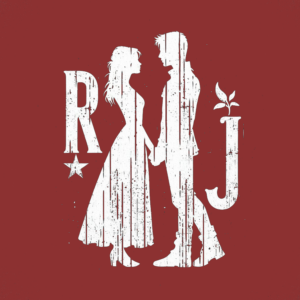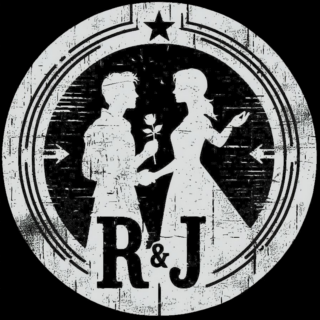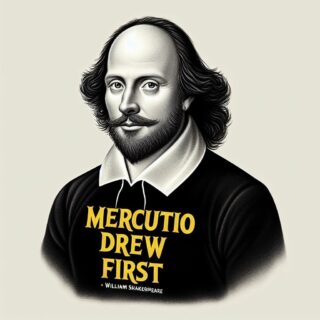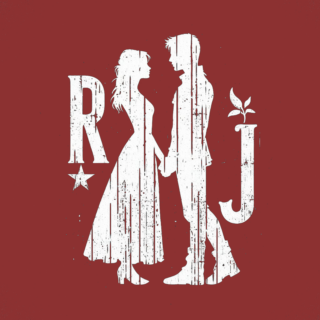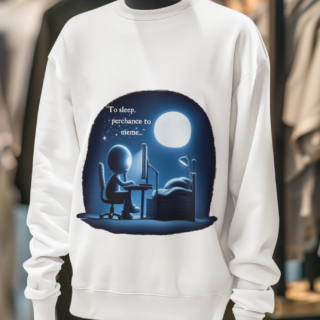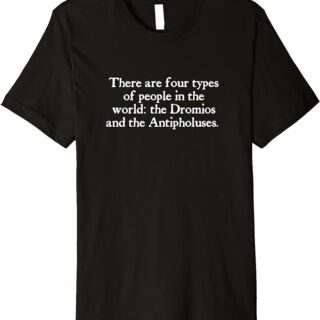HAMLET
By William Shakespeare
GUARD. Do you hear something?
GUARD. No.
GUARD. Oh, never mind then. I like it.
Month: November 2006
Troilus and Cressida
Found this quick link to a blog where they’re having a fairly lengthy discussion about Troilus and Cressida. Not one of the plays you hear much about, so I thought I’d share the link love.
How Old Is Romeo in Romeo and Juliet?
How old is Romeo? There’s a simple question. Sure, we all know Juliet is 13, because the nurse immediately tells us. And often, I think we then make the leap and assume that Romeo is also 13.
But that’s hardly true. Would that imply that Mercutio, Tybalt, and Paris are also all about 13? Surely it was the case that men simply chose younger wives (Capulet is much older than his wife, is he not?), and actually, we can assume that Romeo and the others are in what, maybe in late teens or early 20s?
It wouldn’t be a good idea to point out that age difference these days, of course. I can just imagine Romeo & Juliet being closed down because it promotes pedophilia or something. But honestly, I’m cool with it (the age difference, not the pedophilia!) The more I read the play, the more I appreciate that Juliet is the most mature person in it. That she’s 13, surrounded by people a generation older than her, is quite impressive. I don’t need to make her older to justify anything, and I don’t need to make Romeo younger to balance it out.
Romeo can be older and still be rash and impetuous. Juliet can be young and be the smart one. It’s better than trying to imagine 13-year-old Tybalt saying, “I hate the word as I hate Hell….”
But How Old Is Romeo?
The short answer is that Romeo’s age is never mentioned in the play’s text. Romeo is old enough to be running around in the streets of Verona with his friends. His father, Lord Montague, doesn’t even know where he is. That’s all we get to work with.
Did You Know?
I learned something interesting while looking at the trivia for Baz Luhrmann’s movie. Natalie Portman auditioned for the role of Juliet. But because of her small frame, in her words, “Leonardo looked like he was molesting me.” The director said the same thing I said above, only backward — “Leonardo was 21, but could look 18 – and she made him look 21.” In other words, he looked too old, not that she looked too young. So that certainly backs up the idea that you have to cast R&J of roughly equivalent ages to avoid squicking out your audience.
Much Ado About Reworked Shakespeare
So the other day I get an email from the author of Shakespeare Reworked, Roger Tudor, asking me to check it out. He’s offering, in his words, a “modernised, completely understandable, fully hyperlinked, illustrated e-text version of ‘Much Ado About Nothing’ that keeps all of Shakespeare’s original rhythm and rhyme scheme.” It’s a for sale e-book. I’m intrigued. (As a matter of fact Roger and I have been engaged in spirited debate ever since over the supposed religious sacrilege of even attempting such a feat.) Since he was good enough to send me a copy of the PDF, I put it on my PDA and have been reading. You know what? I like it. I really do. This is not some sort of borderline novelization where he just went off and retold the story his own way. Nor is it one of those thesaurus-driven translations where he went through the text and swapped out all the hard words for easy ones. (Have I mentioned how much I hate those?) Instead he’s endeavored (over 10 years, he tells me) to match rhythm and rhyme as well. What he ends up with is indeed something that feels very much like a Shakespeare play, only you realize while reading it that it’s easier to understand than you remembered. Example? Shakespeare: Beat. Alas! he gets nothing by that. In our last
conflict four of his five wits went halting off, and now
is the whole man governed with one: so that if
he have wit enough to keep himself warm, let him
bear it for a difference between himself and his
horse; for it is all the wealth that he hath left,
to be known a reasonable creature. Who is his
companion now? He hath every month a new sworn brother. Reworked: Beat. Ah yes, but he gets nothing out of those! During our last
conflict most of his wits limped away, and now the whole
man is managed by a scrap of wit – so that if he has
enough wits about him to keep himself warm, let him
regard it as the single difference between himself and his
horse; since it is his only sign of superiority, to be
regarded as a reasoning creature. Who is his closest
comrade now? Every month he has a new brother-in-
arms.
That’s a quick and easy sample, partly because I’m not intimately familiar with “the good bits” of Much Ado, but also because I’m at work and don’t have time to pore over both texts looking for a better one. I was going to hunt down Dogberry and the whole “I am an ass” bit, but didn’t have time. The book itself is also heavily hyperlinked ,and sprinkled with illustrations and music references. Personally, for me, I don’t need that. If I’m going to read it I’m doing so for pleasure, on my PDA. Not for research, and not sitting in front of a browser. But I’m sure I’m not his regular audience. Go check it out, if you’re not grossly offended by the thought of reworked Shakespeare :). For that matter, I’ll leave with the question that I’m debating with the author: What’s your position on the subject? Are the “original” words sacred text that should forever be studied and performed as is, even if the modern audience drifts away and Shakespeare is left entirely in the hands of the ivory tower academics to examine, analyze and debate? Or Shakespeare merely engaging in what modern authors should as well, namely to take the words and ideas of his predecessors, incorporate his own and keep them in front of a changing audience? My position is best summed up as this : If it is true that the potential audience for Shakespeare’s work has dwindled over the years, it is a failing not of Shakespeare’s work but of our(*) ability to get it out there in front of people. And by “our” I mean “people that *get* Shakespeare”. People that know how good it is, and the sort of impact it can have on your life. I don’t know about anybody else, but I want to share that. It’s not my profession. It’s not even something for which I’ve got a great deal of evidence or experience. I read books by Garber and Bloom and Greenblatt and think, “Good books, but these people have made careers out of studying Shakespeare. Do they still connect with an audience that …well, doesn’t?” When I find people who claim to not understand Shakespeare, or worse who claim to hate it, that makes me sad. Where possible, then, I work to better educate people’s understanding of the topic. I’m pretty sure that I will never point to a reworked Shakespeare and tell somebody “Here, read this instead, it’s the same general idea.” That very sentence makes me flinch, actually. If I knew I could hand something something and say “Read this, not only will it make you want to experience Romeo and Juliet for yourself, but you’ll discover that maybe it’s not as alien as you might have thought,” I think that’d be my ultimate desire. If somebody asked me what kind of Shakespeare book I think I’ll ultimately write, I think I just described it. Anybody else?
The Shakespeare Chronicles
What’s almost as good as reading Shakespeare? Reading books about Shakespeare. Even better, novels about stuff having to do with Shakespeare. The Shakespeare Chronicles is a new novel by James Boyle that’s released under Creative Commons. Which, among other things, means that you can download it a piece at a time for free, or get the ebook for $1.50, or get the paperback from Amazon. Your choice! A novel that is part literary mystery, part historical detective story, built around an obsessive search for the true author of Shakespeare’s works. Stanley Quandary is a professor of English and a very ordinary man. But then he starts to have the strangest and most realistic dreams, dreams that seem to solve one of the greatest mysteries of all time, to expose a conspiracy of silence that is over 400 years old. They even suggest a way to win back his estranged wife. Of course, he might be going insane… Works for me! Sounds a bit like The DaVinci Code for us Shakespeare geeks. I’ve already downloaded my copy.

